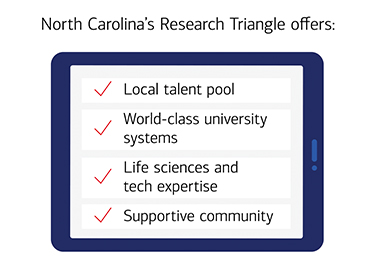Building a successful tech business ecosystem
Founders, investors and the organizations that support them came together at the Bank of America Triangle Innovation Summit to discuss how North Carolina has all the right components for building a successful business ecosystem.
7 minute read
Key takeaways
- The North Carolina research triangle is developing as an alternative tech industry hub.
- It leverages an educated workforce and a network of entrepreneurs — plus life sciences and tech expertise — to nurture and grow talent.
- Advancing the ecosystem means supporting early-stage companies and tapping into local resources to encourage innovation.
An alternative hub for the tech industry
When Jared Sokolsky and his partners started their business, he said, “We had a decision to make: whether we were going to focus our energy in building the majority of our team here in North Carolina or in Boston.”
Sokolsky, CFO of Well, an early-stage digital healthcare business, said the team chose Chapel Hill, N.C. — one of the cities, along with Raleigh and Durham, that historically have defined North Carolina’s Research Triangle. “We landed on North Carolina — because when you look at our employee base, we knew we were going to need a unique mix of folks on the technology side, both in terms of engineering and in terms of data science. But then we also needed folks with deep healthcare experience, and those who really understood not only the provider side of the world, but also the payer side,” he said. “And a lot of that tilted us to North Carolina.”
How North Carolina delivers
Sokolsky told his company’s story at the second Bank of America Triangle Innovation Summit, where a number of speakers credited North Carolina with the right components required for building a successful business ecosystem: the local talent pool, the world-class university systems, the expertise in the life sciences and tech industries — and on top of all that, a close-knit, supportive community.

There also are intentional efforts to further develop the Triangle as an alternative hub of the tech industry. “We focus on how to grow the Triangle ecosystem to a point of global dominance over the next 10 years,” said tech entrepreneur Bill Spruill, founder of 2ndF. His organization provides networking and mentorship to grow the Triangle’s tech community and also to advance minority participation in the tech industry.
“We focus on how to grow the Triangle ecosystem to a point of global dominance over the next 10 years.”
Another organization, NC Innovation, is a public-private partnership designed to provide grants and mentorships to academic researchers across the state, which already has deep resources from the Triangle’s three big research campuses: Duke University, North Carolina State University and the University of North Carolina. NC Innovation was backed initially by $25 million from the private sector and then by a $500 million endowment from the state legislature. A key goal, executive director Bennet Waters said, is to identify big ideas coming out of the university campuses and keep those innovations and potential entrepreneurs in North Carolina.
Building momentum
Many entrepreneurs do stay — or come back to — the Triangle, and can be fiercely loyal. Panelists say that commitment to the local economy has created a flywheel in the Triangle: Once the flywheel is spinning, its momentum is easier to maintain and grow.
“We celebrate entrepreneurship, and we really pride ourselves in growing talent that will go on to do their own entrepreneurial ventures,” said Rebecca Bottorff, Chief People Officer of Raleigh-based Bandwidth. “We stay, we build our companies here and keep the flywheel going so that other companies can grow and thrive with the talent that's created, with the opportunity and the resources that that brings.”
“We celebrate entrepreneurship, and we really pride ourselves in growing talent that will go on to do their own entrepreneurial ventures.”
In addition to Bottorff, three Bandwidth alumni — Chris Chuang of Relay, Lance Condray of BRCK and Doug Neumann of Arpio — were featured on a panel at the Bank of America Triangle Innovation Summit discussing the importance of tentpole organizations in new and growing ecosystems. Since their time at Bandwidth, each has founded their own startup and also chosen to remain in or return to North Carolina.
The importance of talent
Talent is also a critical component to a healthy ecosystem. Sokolsky further commented: “What has surprised us over the past few years is just how much we've been able to recruit the talent we needed here in this area. People were drawn to North Carolina, especially during the pandemic — moving here of their own volition, or when they saw a job posting and thought, ‘You know what, that would be a great place to live.’ We've really been able to lean into that as well, and it's proven to be very successful for us in terms of bringing that unique mix together here in Chapel Hill and in the Triangle area.”
The area’s top-notch universities are key to the abundance of talent, panelists said. Condray, CEO and founder of BRCK, said, “We have an amazing pool of talent coming out of the universities.” But he also pointed out that — partly because of those university connections — the Triangle ecosystem has developed expertise in specific verticals, notably healthcare and life sciences. He wants even more of that targeted development. “If the larger community can reinforce a few targeted thrusts, we will have the opportunity to become known for these things on the global stage,” he said.
“We have an amazing pool of talent coming out of the universities.”
Despite the Triangle’s successes and support network, panelists said there’s still room to grow the area’s business resources — for instance, even better mechanisms for knowledge sharing and mentorship between entrepreneurs.
Evolving funding options
In terms of funding options, Chuang, CEO and founder of Relay, said, “I do think that while we've come a long way in terms of local capital, we still have a way to go to really create an environment where capital is more locally abundant and there are stronger networks between investors and entrepreneurs.”
Waters agreed that too many good ideas and early-stage companies are leaving the state in search of funding. “What we’re seeing is that venture capitalists are coming to North Carolina, but they have two suitcases: one they’re going to live out of for the week while they’re prospecting, and another empty one they’re going to load up with intellectual property talent and ideas to take back to where they came from,” he said.
“There’s a million reasons to bet on the Triangle: tier one universities, an influx of smart people, awesome companies and a great infrastructure.”
One locally focused option is the Triangle Tweener Fund; general partner Scot Wingo said the fund’s goal is to invest specifically in early-stage Triangle-based companies with valuations between $1 million and approximately $80 million.
“There’s a million reasons to bet on the Triangle: tier one universities, an influx of smart people, awesome companies and a great infrastructure,” Wingo said.
Advancing the ecosystem
Wingo and other panelists kept coming back to the importance of the unique collegiality within the Triangle. Neumann, CEO and founder of Arpio, remembered meeting the founder of another locally based technology company and making the decision to become an early customer. “We're paying it forward in this ecosystem. My thought was: You're going to be a customer of this company, and it's going to help them move forward,” he said. “The mindset is: Let's get early-stage companies in front of the businesses that need their services, and let's help them get introductions where they might not necessarily have the network to make that happen. I think that is a huge part of advancing the ecosystem here.”
Bank of America Triangle Innovation Summit
A gathering of industry leaders in North Carolina’s research triangle




